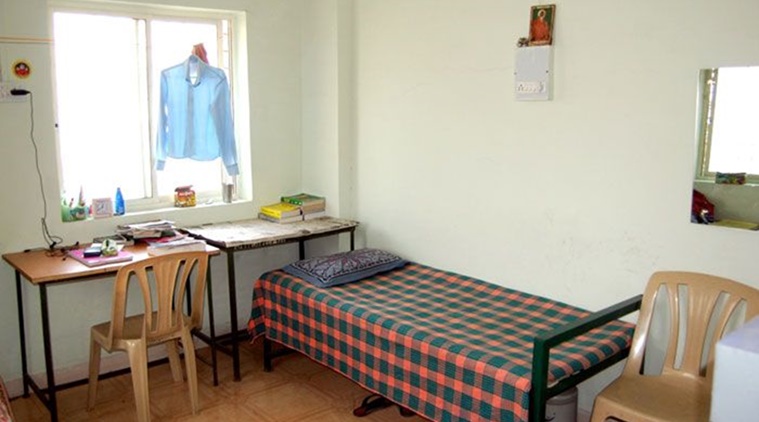- India
- International
DU admissions 2018: Room hunt! Gyms, soft drinks and start-ups, the new way to live on campus
DU admissions 2018: Five students from Ramjas College, who began as ‘aggregators’ and managed to collect Rs 8 lakh in 22 days, started 'YourShell', a start-up company, in 2016 with a Rs 35 lakh grant from the government’s Startup India Initiative.
 DU admissions 2018: Such is the rise in property rates that homeowners in and around North Campus are giving their properties on rent to ‘PG managers’, and living elsewhere. (facebook.com/duhostel)
DU admissions 2018: Such is the rise in property rates that homeowners in and around North Campus are giving their properties on rent to ‘PG managers’, and living elsewhere. (facebook.com/duhostel)
DU admissions 2018: From a company started by Ramjas College students to provide housing for newcomers to paying guest accommodations offering gyms and unlimited soft drinks — influx of thousands of students means business. But what used to be an industry operated by a handful of local property owners has evolved considerably in the last few years. “People from neighbouring states, especially Haryana, have become involved. Now every gali (lane) has 10-15 brokers and every single building is being utilised for student accommodation,” said Harish Sharma, a Vijaynagar-based property dealer.
READ | DU cut-offs see marginal dip in second list
Such is the rise in property rates that homeowners in and around North Campus are giving their properties on rent to ‘PG managers’, and living elsewhere. “The value of a 100-sq yard property has increased from Rs 3 crore to Rs 4 crore in the span of a year, and there is tremendous competition among PG managers,” said Bobby Grover, another property dealer. Even students have found a way to earn a profit by turning ‘aggregators’. Students direct newcomers seeking accommodation in PGs free of charge, depending on their requirements. In return, they receive 15-day rent from the ‘PG managers’.
READ | DU admissions 2018: From Kerala, Andhra, Telangana, a spike in applications
But some have taken it a step further. Five students from Ramjas College, who began as ‘aggregators’ and managed to collect Rs 8 lakh in 22 days, started ‘YourShell‘, a start-up company, in 2016 with a Rs 35 lakh grant from the government’s Startup India Initiative. They now run 18 well-equipped PGs across North Campus, having taken them on rent from property owners.

The boom has also factored in students with money to spend. Take, for instance, PGs charging Rs 25,000 a month for a bed in a double-seater room. Many such PGs in the upmarket Shakti Nagar area offer four buffet meals a day, unlimited soft drinks and hot beverages, gyms, medical services, and recreation areas with pool tables, Playstations, table-tennis courts and, in some cases, even swimming pools.
READ | DU admissions 2018: Why BA Programme is dark horse this time
Renu Kalra, who launched one such PG two years ago, said, “We found that there is a section which would pay for these comforts, especially because even when they were living in more basic accommodation, they would end up spending close to Rs 15,000 a month on ordering food they like.”
But Paro Tomar, who lived in one such PG for two years, cited another reason: “My parents put me up in a ‘luxury’ PG even though the cost was steep because they believed it guaranteed greater security than a casually-run enterprise.” Start-up ventures such as Stanza Living and Placio have also entered the market, with five and 25 properties respectively, looking to profit through a more professional and corporate approach in an otherwise unorganised market.
Follow LIVE UPDATES | DU Second Cut-off 2018
Rohit Pateira, co-founder of Placio, a Noida-based start-up receiving investment from Singapore-based Prestellar Ventures, said, “Student accommodation is a huge market, especially in Delhi, worth millions, but there is a serious trust deficit among customers. What we are bringing into it is organisation.” Kalra predicts the explosion this year might force many smaller local players to back out. “There’s just too much competition and they can invest a lot in aggressive online marketing. Even we have decided not to expand our properties this year because of this,” she said. In Satya Niketan, the South Campus hub, the PG economy has so far been operated by property owners and local dealers, who have been letting out AC rooms between Rs 6,000-Rs 9,000 per month.
But Karandeep Singh, a broker from the area, said that might change, with Stanza Living beginning its services in Satya Niketan with a four-building property. “This year, everyone has increased their rates by at least Rs 1,000, since they have priced their beds in the Rs 13,000–14,000 range,” he said.
But even as big players show up, modest businesses like that of Anil Khurana — who began letting out rooms two years ago with basic amenities in his house in Gur Mandi village near North Campus, for Rs 3,000 a month — continue to survive. For now, it’s an economy for everybody.
Sponsored | Empowering Leadership through AI Integration: Catalysing Business Transformation
Apr 27: Latest News
- 01
- 02
- 03
- 04
- 05








































